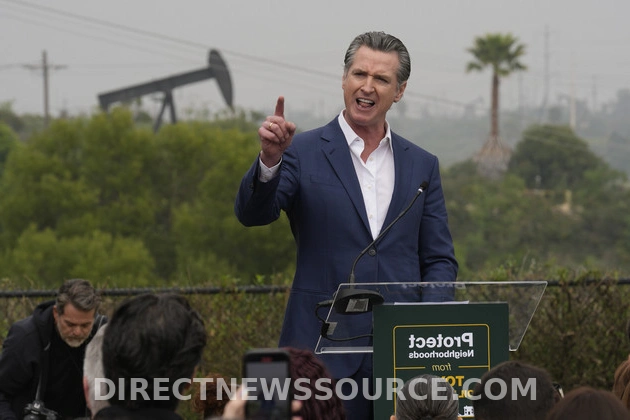
In a pivotal moment for California, Governor Gavin Newsom is gearing up to challenge the oil industry with groundbreaking initiatives aimed at addressing the state’s soaring gasoline prices. As the debate intensifies, the Governor’s decisions in the coming year could either validate his stance or jeopardize it.
Newsom’s administration is on the verge of making crucial determinations on imposing novel regulations on oil refiners, designed to rein in gas prices. While the Governor remains resolute in his pursuit of holding oil companies accountable for excessive profits that burden consumers, critics within the Democratic ranks express concerns over the potential impact on residents, especially amidst a national political landscape in flux.
Despite facing skepticism from some lawmakers, Newsom’s unwavering commitment to a clean energy future and stringent oversight of the oil industry persists. His initiatives include a ban on new gas-powered cars by 2035, legal action seeking climate reparations from major oil corporations, and stringent guidelines mandating the placement of new wells away from residential areas.
Moreover, Newsom is actively exploring strategies to mitigate gas prices, such as proposed measures to cap refiners’ profits and regulate gasoline inventories, slated for further development and potential implementation in 2025.
However, these aggressive moves have drawn attention to the economic ramifications of the state’s environmental policies. Recent updates to the transportation fuel emissions trading program, anticipated to raise gas prices, underscore the complex trade-offs inherent in California’s ambitious climate agenda.
While the Republican minority in the Legislature seizes on the public discontent over escalating prices, Newsom’s adversaries are amplifying their criticism of his administration’s role in fueling the crisis. Amidst the political turmoil, Assembly Speaker Robert Rivas emphasizes the need to prioritize energy affordability without burdening low-income households.
The escalating gas prices, emblematic of a broader affordability crisis in California, have prompted a reevaluation of the state’s energy policies. The Governor’s confrontations with the oil industry have culminated in legislative victories, including bills authorizing profit caps on refiners and bolstering gasoline reserves during maintenance shutdowns.
As the regulatory landscape evolves, industry executives are pushing back against Newsom’s assertions, leveraging media campaigns to sway public opinion. The contentious debate revolves around the intricate interplay between environmental mandates, consumer costs, and industry accountability.
With the looming specter of wildfires and climate-related disasters, California faces a pivotal juncture in balancing economic stability with environmental stewardship. The upcoming deliberations on key legislative proposals will shape the state’s energy future and determine the extent of Newsom’s environmental legacy.
Amidst these challenges, lawmakers are gearing up for intense debates on reauthorizing critical environmental programs and ensuring that Californians reap tangible benefits from these policy decisions.















